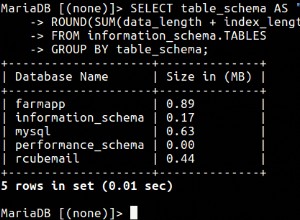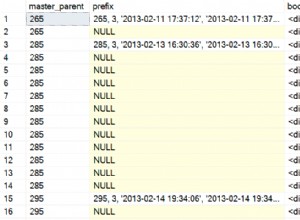यहाँ तालिका संरचना है जिसका उपयोग मैंने इसका परीक्षण करने के लिए किया -
CREATE TABLE `test`.`pages` (
`id` int(10) unsigned NOT NULL AUTO_INCREMENT,
`slug` varchar(45) NOT NULL,
`title` varchar(45) NOT NULL,
`content` text NOT NULL,
`parent_id` int(10) unsigned DEFAULT NULL,
PRIMARY KEY (`id`),
UNIQUE KEY `UQ_page_parent_id_slug` (`parent_id`,`slug`),
CONSTRAINT `FK_page_parent_id` FOREIGN KEY (`parent_id`) REFERENCES `pages` (`id`)
) ENGINE=InnoDB DEFAULT CHARSET=utf8;
(parent_id, slug) पर अद्वितीय कुंजी नोट करें। निम्नलिखित क्वेरी से सर्वश्रेष्ठ प्रदर्शन प्राप्त करने के लिए यह महत्वपूर्ण है। मैंने 50k पंक्तियों के साथ इसका परीक्षण किया और यह अभी भी पांच स्लग पथ के लिए 1ms से कम में लौटा - /cms/slug-1/slug-2/slug-3/slug-4/slug-5/
यहाँ एक उपयुक्त क्वेरी बनाने के लिए PHP कोड दिया गया है -
<?php
// I will assume the rest of the url has already been stripped away
$url = '/fruits/tropical/bananas/';
// lets just make sure we don't have any leading or trailing /
$url = trim($url, '/');
// now let's split the remaining string based on the /
$aUrl = explode('/', $url);
/**
* Now let's build the query to retrieve this
*/
// this array stores the values to be bound to the query at the end
$aParams = array();
$field_list = 'SELECT p1.* ';
$tables = 'FROM pages p1 ';
$where = "WHERE p1.parent_id IS NULL AND p1.slug = ? ";
// this array stores the values to be bound to the query at the end
$aParams[] = $aUrl[0];
// if we have more than one element in our array we need to add to the query
$count = count($aUrl);
for ($i = 1; $i < $count; $i++) {
// add another table to our query
$table_alias = 'p' . ($i + 1);
$prev_table_alias = 'p' . $i;
$tables .= "INNER JOIN pages $table_alias ON {$prev_table_alias}.id = {$table_alias}.parent_id ";
// add to where clause
$where .= "AND {$table_alias}.slug = ? ";
$aParams[] = $aUrl[$i];
// overwrite the content of $field_list each time so we
// only retrieve the data for the actual page requested
$field_list = "SELECT {$table_alias}.* ";
}
$sql = $field_list . $tables . $where;
$result = $this->db->query($sql, $aParams);




